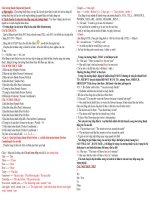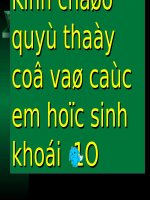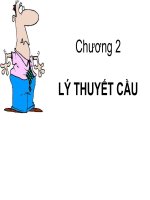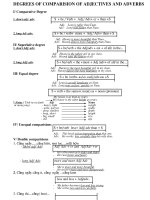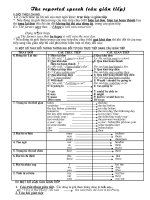LÝ THUYẾT CÂU TƯỜNG THUẬT
Bạn đang xem bản rút gọn của tài liệu. Xem và tải ngay bản đầy đủ của tài liệu tại đây (171.45 KB, 6 trang )
REPORTED SPEECH ( Indirect speech) - Câu tường thuật ( câu gián tiếp)
A/ GIỚI THIỆU CHUNG
1/ Khái niệm : Câu tường thuật là câu thuật lại 1 lời nói, 1 lời phát biểu… của một ai đó (là câu được đặt trong
ngoặc kép ) mà không lặp lại nguyên văn
2/ Hình thức câu tường thuật : có 3 hình thức
a/ Statement : lời phát biểu
Nhận dạng : S + V + (O) , “ S + V + O “.
vd: She said, “ I won’t forget to go to the shopping “
b/ Imperative : Thức mệnh lệnh
b.1 - Affirmative Imperative: Thức mệnh lệnh khẳng định
Nhận dạng : S + V + (O) , “ V
0
+ O “.
vd: The teacher said ,“ Write it down”.
b.2 – Negative Imperative: Thức mệnh lệnh phủ định
Nhận dạng : S + V + (O) , “ Don’t V
0
+ O “.
vd: The doctor said to John “ Don’t stay up late”.
c/ Question : Câu hỏi
c.1 – Yes/No question (câu hỏi Y/N )
Nhận dạng : S + V + (O) , “ ……………. ? “
vd: She asked, “ Are you doing your homework now ? “
c.2 – Wh/How question (câu hỏi với từ để hỏi)
Nhận dạng : S + V + (O) , “ Wh_/How……………. ? “
vd: The wife asked “What did you do yesterday?”.
B/ CÁCH ĐỔI CÂU TƯỜNG THUẬT
Có 3 bước
Bước 1: Đổi các Đại từ trong dấu “ “ sao cho phù hợp với S (người nói) và O (người nghe) ngoài dấu “ “
- Ngôi 1 ( I/me/my ) đổi theo S ; we/us/our cũng đổi theo S ngoài “ “ khi S ngoài “ “ là số nhiều
- Ngôi 2 ( you/your ) đổi theo O
- Ngôi 3 (he/him/his; she/her; it/its; they/them/their ) không đổi
Bước 2 : Đổi các Trạng Từ khi gặp các Trạng Từ dưới đây
Direct Reported
-today
-tonight
-now
-this / these
-here
-tomorrow
+ next (week)
-yesterday
+ last (week)
-(three days) ago
-that night
-that day
-then
-that / those
-there
-the next day / the following day/ the day after
+ the next (week) / the following (week) / the (week) after
- the day before / the previous day
+ the (week) before / the previous (week)
-(three days) before
Bước 3 : có 2 cách – Đổi ĐT chính thành V
ing
/ V
to
hoặc lùi thì
Cách 1: Lùi thì của động từ - Khi Động Từ ngoài dấu “ “ ở Quá Khứ ta lùi thì nghĩa là ta Đổi Động Từ trong
ngoặc “ “ từ Hiện tại về Quá Khứ, từ Quá Khứ về Quá Khứ Hoàn Thành.
Quan sát bảng VD về lùi thì
Direct speech Reported speech
- V
1
Tom said,”I never eat meat”
- am/is/are + Ving
- V
2
/ed
Tom said he never ate meat.
- was/were + Ving
Trang 1 Army
He said, “I’m waiting for Ann.
- has/ have + V3/ed
She said, “I’ve seen that film”.
- V2/ed
They said, “We came by car”.
- He said, “I was sitting in the park at 8 o’cock”.
- will/shall + V
0
Judy said,”I’ll phone you”.
-Modal verbs
+ Can She said,”You can sit here”
+ May Claire said, “I may got to Bali again”
+ Must He said, “I must finish this report”
He said he was waiting for Ann.
- had + V3/ed
She said she had seen that film.
- had + V3/ed
They said they had come by car.
-He said he had been sitting in the park at 8 o’clock
- would/should + V
0
Judy said she would phone me.
-Modal verbs in the past
+ Could She said we could sit here
+ Might Claire said she might go to Bali again
+ Must / Had to
He said he must / had to finish this report.
Cách 2: bỏ chủ từ và các trợ Động từ, tìm động từ chính để đổi thành V
-ing
hoặc V
-to
lệ thuộc vào động từ ta
dùng trước nó
vd: She said, “ I won’t forget to go to the shopping “. Bỏ S - I và trợ ĐT - will
She promised (not to forget) to go to the shopping .
S + V + (O) + (not) Vto
V + o + (not) + Vto V + (not) + Vto
ask
advise
allow
beg
encourage
expect
forbid
invite
u cầu
khun
cho phép
nài nỉ
khuyến khích
mong đợi
cấm
mời
order
persuade
request
remind
urge
tell
warn
want
ra lệnh
thuyết phục
u cầu
nhắc nhở
thúc giục
bảo
cảnh báo
muốn
agree
hope
offer
refuse
propose
promise
threaten
want
đồng ý
hy vọng
đề nghị
từ chối
đề nghị
hứa
đe doạ
muốn
S + V + O + PREPOSITION + V-ING
1. accuse SB of doing Sth: buộc tội ai về việc gì.
2. blame SB for doing Sth: đổ lỗi cho ai về việc gì
3. congratulate SB on doing Sth: khen ngợi ai về việc gì
4. criticize SB for doing Sth: chỉ trích ai về điều gì
5. warn (SB) against doing Sth: khuyến cáo (ai) đừng làm điều gì
6. warn (SB) about doing Sth: khuyến cáo (ai) điều gì
7. praise SB for doing Sth: ca ngợi ai về điều gì
8. thank (SB) for doing Sth: cảm ơn ai về việc gì
9. prevent SB from doing Sth: ngăn ai khỏi việc gì
S + V + PREPOSITION + V-ING
1. apologise for doing Sth: xin lỗi vì đã làm gì 2. complain about Sth: than phiền về điều gì
3. insist on/ upon doing sth: khăng khăng đòi làm gì 4. dream of doing sth: mơ tưởng tới cái gì
5. think of doing sth: nghỉ tới ai/ cái gì
S + v + V-ING
1. admit doing sth: thừa nhận đã làm việc gì
2. deny doing sth: phủ nhận đã làm việc gì
3. suggest doing sth: đề nghò làm việc gì
Trang 2 Army
MỘT SỐ TRƯỜNG HỢP DÙNG ĐỘNG TỪ THÍCH HỢP DỰA VÀO DẤU HIỆU SAU
Động từ chính V
to
Động từ chính V
ing
S + should/ ‘d better + V
0
advise + V
to
Sorry/ I’m sorry. aologize (to sb) for
S + will/ won’t + V
0
promise Thanks/ Thank you thank for
Can/could + S + V
0
offer Why don’t S + V
0
……. ? suggest
Let + O + V
0
offer Let + O suggest
please beg/ offer please suggest/ insist on
‘d like + Vt
0
want want + Vt
0
dream of
‘d like + O + V
0
want + O congratulation congratulate on
Don’t forget/Remember + V
0
remind
Would (S) like + V
0
invite
Okay/ all right/ S agree agree
1/ “ Can I do the washing up ? “, he said . He offered ………………………………………….
“Let me give you some money”, he said. ………………………………………….
2/ “ I won’t forget the shopping “, she said. She promised ………………………………………
“I will help you”, she said . ………………………………………….
3/ “ Would you like to come to my party ? “ , he told. He invited ……………………………………….
“Would you like to have dinner with us tonight,” Mike said. ………………………………………….
4/ “ I’d like to become the doctor”, said my sister. My sister wanted…………………………………
“ I’d like you to repair my house, John , “ said Marry. Marry wanted John…………………………
5/ “ You should stop smoking “ , the doctor told me. The doctor advised me………………………………
“You’d better spend more time learning to write,” I said to the boy.
………………………………………….………………………………………….
6/ “ Wait outside !”, I said . I told……………………………………………….
“ Write it down,” the teacher said . ………………………………………….
7/ “That’s okay. I’ll give you a hand now”, said he. He agreed …………………………………………….
8/ “Please, please turn off the T.V, John,” said Tom. Tom begged …………………………………………
9/ “Remember to write to me soon,” she said to me. She reminded ……………………………………….
“Bring your umbrella in case it rains”, he said to me. ………………………………………….
“Don’t forget to phone me when you get to London”, said my mom.
………………………………………….………………………………………….
10/ “I’m sorry I broke the glass”, said Peter. Peter apologized for …………………………………
11/ “Why don’t you put your luggage under the seat?”, he asked.
He suggested
12/ “Don’t lean your bicycle against my windows, boys,” said the shopkeeper.
The shopkeeper warned …………………………………………………………………………………
**. Những trường hợp không cần thay đổi khi tường thuật:
1. “must” có thể giữ nguyên hoặc đổi thành “had to”
- “I must finish this report by Monday,” Jill said Jill said that she must finish that report by Monday
2. “should” và “ought to” có thể giữ nguyên hoặc tường thuật bằng cách dùng động từ “advise sb (not) to do
sth”
- “You should practice your English every day,” said Miss Hoax
Miss Hoax said that I should practice my English every day
Miss Hoax advised me to practice my English every day
3. Một số Modals khác như “needn’t do”, “would do”, “could do”, và “might do” thường được giữ nguyên khi
tường thuật.
Trang 3 Army
- “You needn’t do it if you don’t want,” she said She said that I needn’t do it if I didn’t want
4. Câu điều kiện loại 1 thay đổi. Câu điều kiện loại 2 thay đổi hoặc giữ nguyên. Câu điều kiện loại 3 luôn luôn
giữ nguyên
- “If I hear anything new, I’ll let you know,” Paul said
Paul said that if he heard anything new he would let me know.
- “If I knew her number, I could tell you,” Peter said
Peter said if he knew / had knew number, he would tell / would have told me
- “If had came you would you would have met many old friends,” Liz said
Liz said if I had come I would have met many old friends
Áp Dụng: Học sinh cần thuộc bảng Đại từ và chức năng của nó để sử dụng đúng cột chức năng
Subject Object Possessive adj. ( của..)
I
We
me
us
my
our
You you your
He
She
It
him
her
it
his
her
its
They them their
a/ Dạng : S + V + (O) , “ S + V + O “. Đổi theo 3 bước
vd: She said, “ I won’t forget to go to the shopping “
B1: trong “ “ có 1 Đại từ I nên đổi theo S là She
B2: trong “ “ không có trạng từ cần đổi
B3: lùi thì tức đổi will thành would hoặc bỏ Chủ từ I bỏ trợ ĐT won’t forget
Câu hoàn chỉnh - She said she would not forget to go to the shopping .
Hoặc - She promised to go to the shopping .
b/ Dạng : S + V + (O) , “ V
0
+ O “. Đổi theo bước 1 và 2 bỏ “ “ thêm to vào trước V
0
vd: The teacher said ,“ Write it down”.
B1: trong “ “ không có đại từ nào (xem bảng Đại từ)
B2: trong “ “ không có trạng từ cần đổi
Câu hoàn chỉnh - The teacher said to write it down.
Hoặc -
Dạng : S + V + (O) , “ Don’t V
0
+ O “. Đổi theo bước 1 và 2 bỏ “ “ , bỏ Don’t thêm not to vào trước V
0
vd: The doctor said to John “ Don’t stay up late”.
B1: trong “ “ không có đại từ nào (xem bảng Đại từ)
B2: trong “ “ không có trạng từ cần đổi
Câu hoàn chỉnh - The doctor told John not to stay up late .
Hoặc -
c/ Yes/No question (câu hỏi Y/N )
Nhận dạng : S + V + (O) , “ ……………. ? “ trả về dạng khẳng định, thêm if/whether, đổi theo 3 bước
vd: She asked, “ Are you doing your homework now ? “
Trả về dạng khẳng định She asked, “You are doing your homework now “
B1: trong ngoặc kép có 2 Đại từ You , your đổi theo O ( câu này không có O ta tự thêm thường là me )
B2 : trong “” có 1 Trạng từ now then
B3: lùi thì tức đổi are thành was/were
Câu hoàn chỉnh - She asked me if/whether I was doing my homework then.
c.2 – Wh/How question (câu hỏi với từ để hỏi) trả về dạng khẳng định , đổi theo 3 bước
Nhận dạng : S + V + (O) , “ Wh_/How……………. ? “
vd: The wife asked “What did you do yesterday?”.
Trang 4 Army
Trả về dạng khẳng định The wife asked “What you did yesterday?”.
B1: trong ngoặc kép có Đại từ You nên đổi theo O ( câu này không có O ta tự thêm her husband )
B2 : trong “” có 1 Trạng từ yesterday the day before/the previous day
B3: lùi thì tức đổi did thành had done
Câu hoàn chỉnh - The wife asked her husband what you had done the previous day.
Exercise – Change the following sentences into Indirect Speech
1/ “ I phone the police “ , she said . She threatened …………………………………….
2/ “ Don’t stay up late,” the doctor said to John. ……………………………………………….
3/ “ I saw her on my way to school yesterday”, he said. ……………………………………………….
4/ He said, “I’ll leave here tomorrow”. ……………………………………………….
5/ Mary told me, “I saw them at this place”. ……………………………………………….
6/ “I met her about 3 months ago”, he said . ……………………………………………….
7/ “I’m trying to listen to the music”, she said . ……………………………………………….
8/ “I must go out to post this letter now, Mum”, he said. ……………………………………………….
9/ “I can’t speak any foreign languages”, he said . ……………………………………………….
10/ “What did you do yesterday?”, the wife asked. ……………………………………………….
11/ “Do you like watching detective stories?”, my sister asked me.
………………………………………………………………………………………….
12/ Isabel: “You can’t borrow my pen, Robert!”.
---> Isabel…...……………………………………………………………………………………
13/ “I don’t want to be criticized by non-professionals”, said the film star.
---> The film star objected…..………………………
14/ “If I were you, I’d look for another job”, said one of my friends.
---> One of my friends…………………………………
15/ “Don’t move or I’ll shoot”, said the bank robber to the clerk.
---> The bank robber threatened
16/ “Don’t swim out too far, boys”, said the coach.
17/ “You should see the doctor.”, said Lan. ………………………………………….
18/ “You should take science appreciation courses at school”, she said.
………………………………………….………………………………………….
19/ “You should have waited for us, Bill”, said the coach. ………………………………………….
20/ “I’ll see you tomorrow”, she said. ………………………………………….
21/ “Don’t forget to phone the police”, she told him. ………………………………………….
22/ “Why don’t you ask her yourself?”, I said to my brother
23/ “Shall we go for a swim now?”
She suggested..................................................................................................................................
24/ “I know I am wrong”
He admitted….................................................................................................................................
25/ “I desperately want to become a doctor”
He dreamed….................................................................................................................................
26/ “I won’t allow you to get in touch with him”
Her father prevented her.................................................................................................................
27/ “I didn’t say that”
She denied…..................................................................................................................................
28/ “It’s really nice of you to visit me”
She thanked him..............................................................................................................................
29/ “You’ve stolen my bicycle”
The boy accused his friend.............................................................................................................
30/ “I really need a break after lunch”
The boy insisted on.........................................................................................................................
31/ “I’ve broken the mirror”
Trang 5 Army

